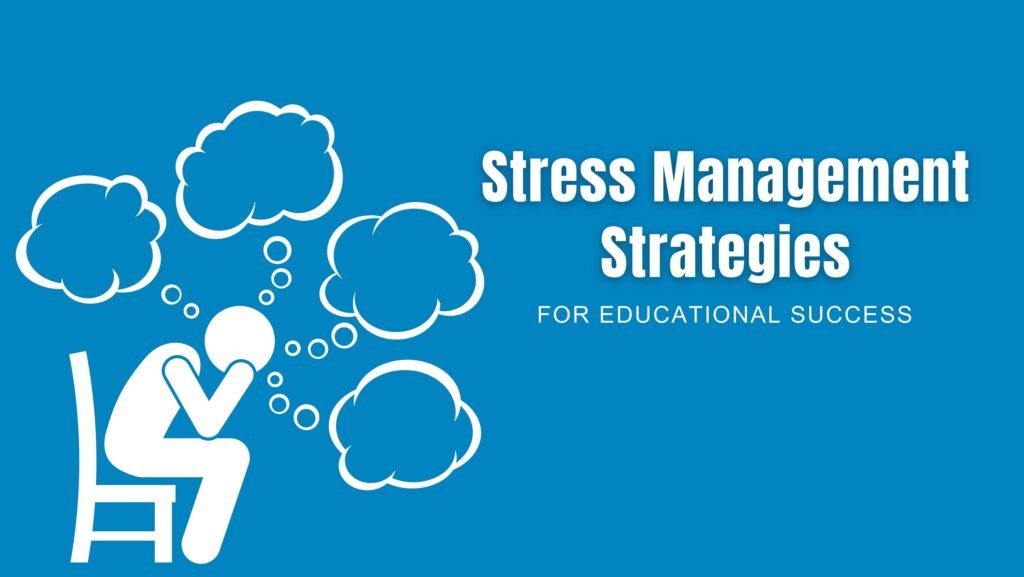While changing educational excellence, students today face a number of challenges and pressures. From the demands of academics to the social dynamics of school or university life, stress has become an ever-present companion on the journey to success. While a certain level of stress can be motivating, too much of it can be harmful for you and your health. The ability to effectively manage this stress is not just a desirable skill but often a crucial one for students striving for educational success.
Stress can take different forms such as sleepless nights, anxiety, and even physical diseases. When unmanaged, it becomes a horrifying barrier that hinders learning, creativity, and personal growth. This article is designed to make students aware of the knowledge and tools needed to not just survive the educational rollercoaster but to thrive despite its challenges.
Whether you’re an overburdened college student facing exams or a high schooler pending assignments and extracurricular activities, the article will guide you with certain strategies that help you navigate the often massive world of education with flexibility and balance.
The journey to educational success is a demanding one, but with the right tools and a proactive approach to managing stress, you can not only meet the challenges head-on but also achieve your goals while maintaining your mental and emotional health.
Understanding Stress and Identifying its Sources
Stress is a general phase of student life, with profound implications for their educational journey. It’s essential to grasp the fundamental concepts of stress, its origins, and the far-reaching consequences it can have on students’ academic life and general well-being.
Stress is the body’s natural response to perceived threats or demands, triggering a series of physiological and psychological reactions. For students, it can manifest as worry, tension, or unease.
Stress can serve as a motivating force, urging students to meet deadlines or excel in exams. However, when it becomes long term, it can badly affect their lives.
Students may experience disrupted sleep patterns, reduced focus, and heightened anxiety, all of which can hinder their educational success.
Stress is not a one-size-fits-all experience.
- Positive stress, often referred to as eustress, is the type that can enhance performance, keeping students alert and engaged. It’s the adrenaline rush before a presentation or the anticipation of a challenging but exciting project.
- On the other hand, negative stress, known as distress, is the kind that overwhelms and debilitates. This might result from excessive workload, excessive work pressure, or personal issues. Recognizing the distinction between these two forms of stress is vital in managing its impact effectively.
How Stress Affects Academic Performance
Stress and academic performance are closely interlinked. While moderate stress can be a catalyst for academic achievement, long-term stress can have the opposite effect.
- The pressures of education, such as exams, assignments, and expectations, often contribute to students’ stress levels.
- When not managed effectively, this stress can lead to a range of academic challenges, from reduced concentration and memory retention to decreased motivation. In the long run, stress can hold back a student’s overall academic success and hinder their capacity to realize their full potential.
Identifying sources of stress is crucial to effective stress management in education.
- These stressors are numerous and diverse, stemming from the pressure of exams and deadlines, the weight of academic expectations, peer pressure, workload, and personal life challenges.
Understanding the specific sources of stress that affect you is a crucial step in formulating an individualized stress management plan. Additionally, the spreading of stress among students is a concerning issue, with numerous studies and statistics revealing its widespread nature.
Research findings show that a significant percentage of students experience stress-related symptoms and challenges during their academic journey, highlighting that stress is not an isolated issue but a collective challenge faced by students across the educational spectrum.
Stress Management Techniques
Effectively managing stress is not a one-size-fits-all strategy. It requires a full approach that includes a range of strategies serving both short-term relief and long-term resilience. Here, we explore a range of stress management techniques designed to empower students in their pursuit of educational success:
- Deep Breathing Exercises:
One of the simplest and most accessible stress-relief techniques is deep breathing. By taking slow, deliberate breaths, you can activate the body’s relaxation response, calming the mind and reducing stress.
Try inhaling deeply through your nose for a count of four, holding your breath for four, and then exhaling through your mouth for another count of four. Repeat this exercise for a few minutes whenever you need a quick stress break.
- Mindfulness and Meditation:
Mindfulness and meditation practices are powerful tools for staying present and reducing stress. They encourage you to focus on the current moment, letting go of worries about the past or future.
Mindfulness involves paying attention to your thoughts and sensations without judgment, while meditation often includes guided exercises to promote relaxation and mental clarity. These practices can be incorporated into your daily routine, even if you have just a few minutes to spare.
- Time Management and Organization:
Effective time management and organizational skills can reduce the ongoing stress of deadlines and workload. Prioritizing tasks, setting goals, and creating schedules can help you stay on top of your academic responsibilities.
Breaking down large tasks into smaller, manageable steps can make them less overwhelming and more achievable. Furthermore, staying organized reduces the anxiety of forgetting assignments or important dates.
- Healthy Lifestyle Choices (Nutrition, Exercise, Sleep):
A healthy lifestyle forms the cornerstone of long-term stress management. Proper nutrition, regular exercise, and proper sleep are vital to maintaining physical and mental well-being.
A balanced diet provides the necessary nutrients for cognitive function, while exercise releases endorphins that boost mood and reduce stress. Adequate sleep revives the body and mind, improving focus and resilience against stress. Consistently making these healthy choices will contribute significantly to your overall stress management.
- Seeking Support from Counselors or Therapists:
When stress becomes immense, it’s essential to seek professional support. Counselors or therapists can provide guidance and coping strategies tailored to your specific needs. They offer a safe space to discuss your challenges, emotions, and stressors, enabling you to develop effective long-term stress management skills. Don’t hesitate to reach out for help when you need it; doing so is a sign of strength, not weakness.
These stress management techniques are versatile tools that can be customized to fit your unique circumstances and preferences. By integrating both short-term and long-term strategies into your life, you can reduce the impact of stress, and navigate the educational journey with greater ease.
Conclusion:
As we conclude our exploration of stress management strategies for educational success, it’s clear that the journey to academic excellence is a path paved with challenges and pressures.
Stress, in its various forms, can either propel us forward or hinder our progress depending on the type whether it’s positive stress or the negative one.
By understanding the nature of stress, pinpointing its sources, and recognizing its impact, students can take the first vital steps toward effective management. The array of techniques, from deep breathing and mindfulness to time management and professional support, provide a diverse toolkit to navigate the complexities of student life.
With these stress management techniques, students can empower themselves to not only survive the educational rollercoaster but to stay ahead despite its challenges, reaching their full potential and realizing their academic dreams.







